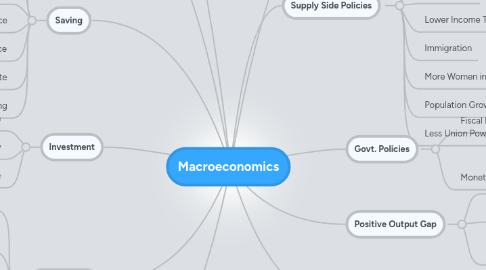Macroeconomics
by Henry Binning


1. Consumption
1.1. Employment
1.1.1. Job Insecurity = Less Spending
1.1.2. No Wages = Less Spending
1.2. Personal Income
1.3. Food, Petrol Prices
1.4. Housing Market
1.5. Natural Disasters (Drought)
1.6. Confidence
1.7. Exchange Rate
2. Government Spending
2.1. Interest Rates
2.2. Government spending on stimulus
2.3. Tax Rate - Lower Taxes = Lower Government Income
3. Investment
3.1. Confidence
3.2. Job Security
3.3. Financial Market Performance
4. Saving
4.1. Interest Rates
4.2. Risk Tolerance of Individual
4.3. Trust in Pension Funds
4.4. Stick Market Performance
4.5. Bank Performance
4.6. Economic Climate
4.6.1. In a recession people save more
4.7. Knowledge About Saving
5. Inflation
5.1. Cost Push
5.1.1. Rise in raw material costs
5.1.2. Rise in wages
5.1.3. Rise in taxes
5.2. Demand Pull
5.2.1. AD higher than AS
6. Unemployment
6.1. Classical
6.1.1. When wage level too high for employers to afford
6.2. Cyclical
6.2.1. Due to recession
6.3. Seasonal
6.3.1. Eg. ski instructor, hotel worker
6.4. Frictional
6.4.1. Time between changing jobs
6.5. Structural
6.5.1. When industry changes eg. textiles in north of England
7. Negative Output Gap
7.1. Unemployment
7.2. Deflationary Pressure
7.3. Govt. imposes Expansionary Policies
7.3.1. Lower Tax
7.3.2. Lower Interest Rates
8. Supply Side Policies
8.1. Investment in capital goods
8.2. R&D
8.3. Innovation
8.4. Skills, Education and Training
8.5. Competition
8.6. Lower Income Tax
8.7. Immigration
8.8. More Women in Labour Market
8.9. Population Growth
8.10. Less Union Power
9. Positive Output Gap
9.1. Lower Unemployment
9.2. Inflationary Pressure
9.3. Govt. imposes Contractionary Policies
9.3.1. Higher Tax
9.3.2. Higher Interest Rates
10. Govt. Policies
10.1. Fiscal Policy
10.1.1. Government Spending
10.1.2. Taxation
10.2. Monetary Policy
10.2.1. Interest Rates
10.2.2. Supply of Money
11. Current Account
11.1. Exports - Imports
11.2. Transfers
11.2.1. People sending money home from abroad
11.3. Investment Income
11.3.1. BP Angola
